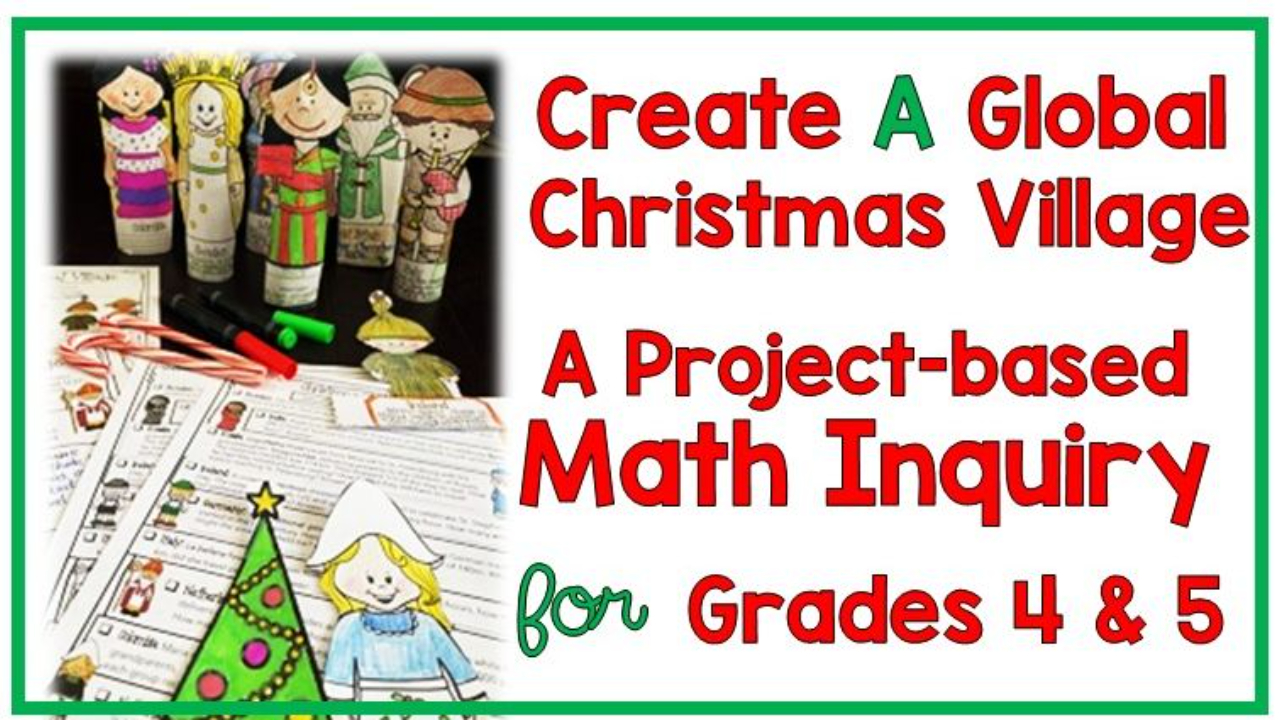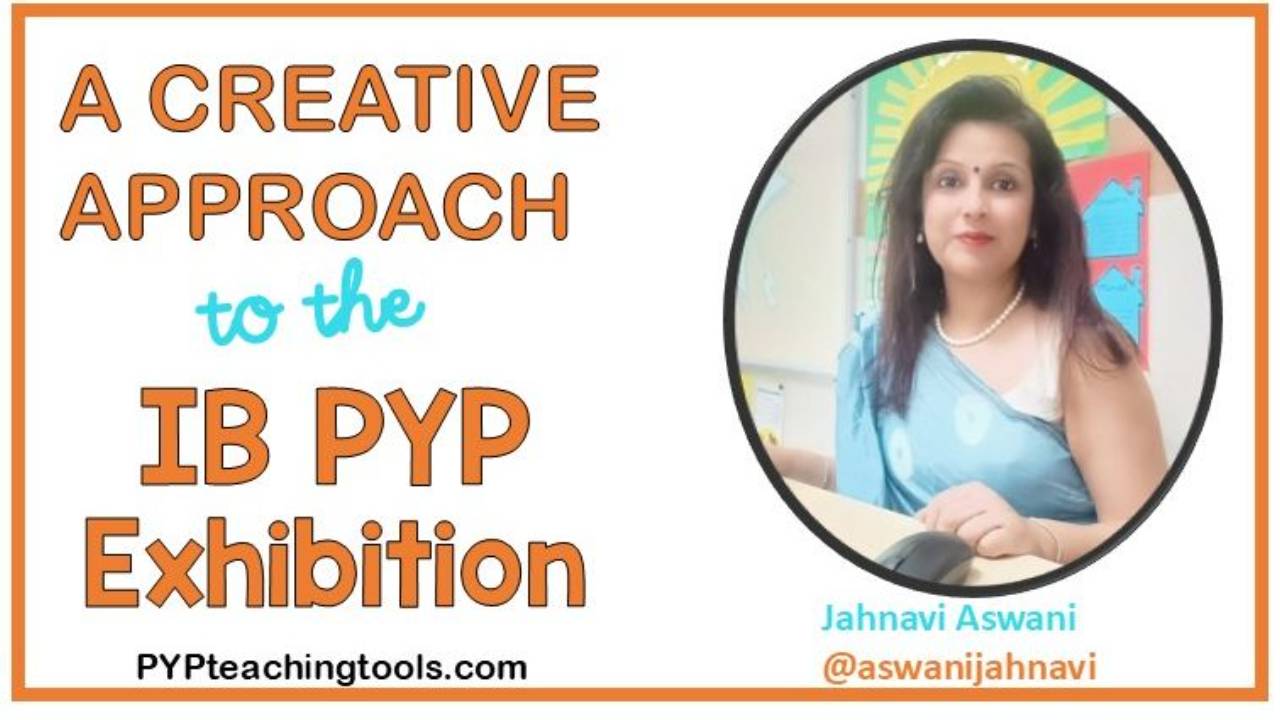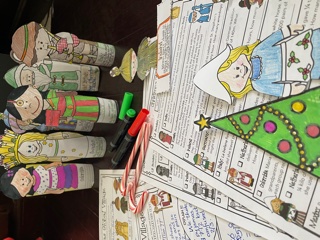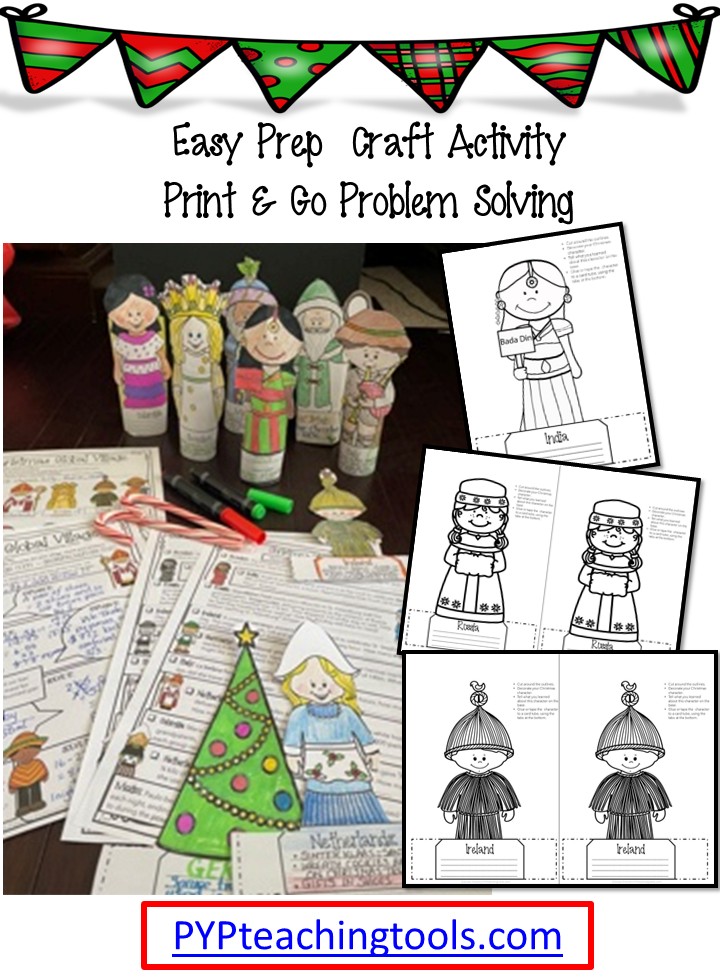Welcome to PYPteachingtools.com
The Global Christmas Village: A Project-Based Math Inquiry for Upper Elementary Students

Challenge your upper elementary students with this inquiry-based math project! The Global Christmas Village engages Grades 4–5 learners in real-world problem solving with number sense, measure and design thinking using festive, global themes.
Transform Math into a Real-World Inquiry
In my Grade 4/5 classroom, the Global Christmas Village Math Inquiry became a highlight of our pre-holiday weeks. What began as a set of differentiated problem-solving sheets evolved into a bustling global village of characters, traditions, and beautifully measured designs all imagined, calculated, and constructed by the students themselves.
This project turned abstract math concepts into something tangible. My students weren’t just solving word problems; they were earning their way into creating a global Christmas village filled with characters and celebrations from around the world.
What the Project Involves
The goal of the activity is to collaboratively create a global village of Christmas tradi...
Bringing IB PYP Concepts to Life: A Creative Approach to Launching the PYP Exhibition

A Creative Approach to Launching the IB PYP Exhibition
written by Jahnavi Aswani, Podar International School, Mumbai
Within our IB PYP community, it is a privilege and a joy to meet so many creative teachers who bring their perspective and flair to our pedagogy. Please enjoy this article written by guest blogger, Jahnavi Aswani as she shares how she and her colleague, Hetal Mehta, brought a creative and immersive experience to their recent PYP Exhibition. Look for the fabulous concept tree and the wonderful stories connecting the concepts with application of attributes and skills. Wonderful work!
In the journey of inquiry, questions are more powerful than answers—and understanding comes alive when learners engage with ideas, not just information. As we began our Grade 5 learners’ PYP Exhibition journey at PIS, we set out to help them explore the specified concepts that would guide their thinking throug...
Spook-tacular Halloween Literacy Activities for Upper Elementary: Supporting IB PYP ATL Skills

There isn't much as scary as Halloween in the elementary classroom! You either love it or hate it! 🎃 Whatever your feelings about Halloween, brace yourself and keep the inquiry flowing with these skills-based learning tools I have for you. And all perfectly aligned for your upper elementary IB PYP classroom.
Thinking & Communication Skills through Literacy
Halloween is the perfect time to bring a little magic to your classroom and engage students with creative, spooky literacy activities. By integrating Halloween-themed tasks into your learning environment, you can provide meaningful experiences that foster critical Approaches to Learning (ATL) skills, such as thinking, communication and social skills; key elements of our IB PYP framework. Below, we explore some eerie-sistible 🎃Halloween literacy activities that will make your planning easier.
1.Spooky Story Starters for Creative Writing _Thinking & Communication Skills
Get your students’ imaginations howling with a Halloween-the...
IB PYP Communication Skills & Accountable Talk

Empowering Your Classroom with Accountable Talk: A Pathway to Deeper Learning
Have you ever noticed how some classroom discussions just fizzle out, while others spark curiosity and connection? That’s where Accountable Talk steps in, breathing life into conversations and adding oomph to student-driven learning. It’s not just another buzzword—it’s a powerful tool for fostering communication, critical thinking, and collaboration in our IB PYP classrooms. When students take ownership of their words and ideas, they’re not only talking—they’re learning.
Let’s dive into what accountable talk really is, why it’s essential, and how you can seamlessly weave it into your everyday teaching.
What is Accountable Talk, Anyway?
Fundamentally, Accountable Talk is about keeping discussions purposeful, respectful, and learning-focused. It’s conversation that pushes understanding forward, where students are responsible for their words and ideas, holding themselves accountable to their classmates, t...
5 Keys to Develop Collaborative Learning Experiences in the IB PYP

There is no doubt that within most of the IB PYP units of inquiry we have those subjects that have to be addressed as "stand alone" lessons that require explicit teaching and a very real need for paper and pencil work. However, when it comes to engagement, we need to remember that hands on investigation, authentic application of the skills and student input is far more memorable for the children, enables transfer of understanding and supports a sense of ownership. Let's talk about the collaborative learning experience. I am using maths and reading skills as an example but it can be applied to any subject. Welcome to OPERATION COOPERATION.
..... it is fundamental to the philosophy of the PYP that, since it is to be used in real-life situations, mathematics needs to be taught in relevant, realistic contexts, rather than by attempting to impart a fixed body of knowledge directly to students -Oxford Mathematics & IBO
I will be sharing some real-world examples from my classroom with m...
Mentoring the Mentors within the IB PYP Exhibition

Within the IB PYP Exhibition, your team of mentors are a crucial support tool for students and facilitators alike. They are often a mixture of other staff members ( teachers, support staff ), members of the local community and parents. Many mentors are coming to the Exhibition for the first time. And, even if it isn’t their first time, its so important to ensure right from the very beginning, that everyone is on the same page. Mentoring your mentors is one key to making the journey a smoother one. I have a couple of GREAT tools to help! In this article, you will find a fantastic video, a free guide and my best-selling Exhibition journal. If this is your first journey through the PYP Exhibition, make sure you grab your FREE timeline here.
[caption id="attachment_3787" align="alignnone" width="980"] Get your FREE Exhibition timeline now![/caption]
Get your FREE Exhibition timeline now![/caption]
Within my student journal, Journey Through the PYP Exhibition, you will find ideas for mentors as well as clarifying with students, ho...
Student Agency, Engagement & Independent Inquiry in your IB PYP Classroom
Well, let's talk (again) about student agency and how to increase it within your classroom. Keeping in mind that it is far more than flexible seating and independently gathering resources, and more about giving the children voice, choice and action in their own learning, I'm heading straight to student engagement and developing independent inquiry. And there's a FREE sample for you too.
Student Engagement: So, What Does It Really Mean?
Student engagement is a challenge that each of us has encountered at some point within every year. It’s a lot to expect children to devote their full attention to school for eight hours straight. It is natural that they will lose focus at times, but there are strategies we can use to help them to increase this Self-Mangement skill of maintaining their focus. It’s also important to remember that engagement also involves interest, curiosity, and motivation. Are you familiar with Phillip Schlechty's five levels of engagement? His research has delinea...
Mindfulness in the Classroom
Mindfulness. It seems to be another of those words that is making the rounds lately. Mindfulness. To me there are so many takes on the word and I feel that it is one of those trends that we do within the IB PYP anyway. I was curious as to how the children perceived this word and so, I asked.
The responses were eye-opening really. Thankfully, many of the kids referred to the IB Attitudes, since we are constantly using this language and philosophy in school. It surrounds them.
Practicing Mindfulness
An Attitude of Appreciation.
Quiet Time: Intentional t...
Integrating Math into an IB PYP Unit of Inquiry


I’m often asked how I integrate maths into our IB PYP units of inquiry. I won’t deny that depending on the unit, it can sometimes be easier said than done. However, I’ve found over the years, that it’s best to keep it relaxed and, if necessary, simply focus on concepts in maths rather than content. Often, especially within the public IB schools in the USA, we are expected to meet certain maths standards by a certain time. This often results in a clash of math units and units of inquiry and a creative juggle ensues. But hey, who doesn’t love a challenge? The rest of the IB world? You’ve got it luckier, I assure you! Anyway, a great resource for math in the beginning of the year is https://www.youcubed.org/. It encourages a maths mindset and is centred around collaborative thinking. It does require signing up for a free account but, once you’re in, you can view the Week of Inspirational Math. This gives you a couple of days of lessons ...
IB PYP Approaches to Learning Skills

It Takes Skills!
The word is well and truly out. The newest hub bub in the IB world is the Approaches to Learning Skills. Formerly known by the International Baccalaureate Organisation as the Transdisciplinary Skills, these are, simply put, a set of skills that we use when we are involved in learning. They come grouped into five sets: Thinking, Social, Self Management, Research and Communication. They naturally have growth mindset occurring within them, since they cover many different behaviours, self control as well as thinking and communication strategies.

As part of your IB PYP classroom, it is usual to see the skills listed somewhere within the room, as posters ( more posters can be found in my store here and also here) and as part of our daily learning objectives. We often refer to those throughout our week and I also like to list them on my daily Learning Objectives boards, tied in with the subject and goals for that day.

By incorporating the skills (as well as the L...






